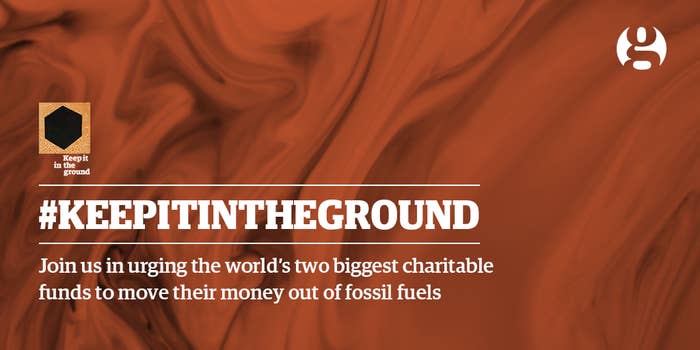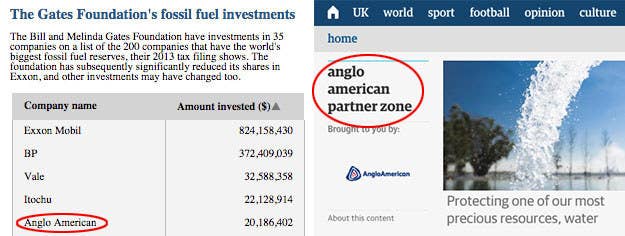Earlier this month, The Guardian launched a major campaign called Keep it in the ground, targeting fossil fuel companies.

At the heart of the campaign, launched in associated with the climate campaign group 350.org, is a petition to persuade the world's two largest charitable funds to abandon their investments in fossil fuel companies. The petition has so far been signed by almost 150,000 people.
The two charitable funds being targeted, the Bill and Melinda Gates Foundation and the Wellcome Trust have assets worth approximately $66 billion between them. The Guardian claims that according to its 2013 tax filings, the Gates Foundation has more than $1.4 billion invested in fossil fuels companies. It adds that in 2014, the Wellcome Trust, which spends billions on medical research, had at least $660 million invested in firms such as Shell, Rio Tinto, BHP Billiton, and BP.
The Guardian has called upon the two to "commit now to divesting from the top 200 fossil fuel companies within five years and to immediately freeze any new investments in those companies", because "it is morally and financially misguided to invest in companies dedicated to finding and burning more oil, gas and coal".
One of the 200 companies The Guardian lists is one of its own "sustainable business partners".

It is also not clear whether Guardian Media Group (GMG) invests in fossil fuels itself.
In a Q&A on The Guardian's website, its head of environment, Damian Carrington, points out that the Wellcome Trust "won't disclose their full fossil fuel holdings, despite saying they are 'transparent'". However, in GMG's annual report for 2014, there is no breakdown of the company's investments, so it is impossible to tell whether its money is invested in any fossil fuel companies. GMG claims to have £842.7 million in investments "in a diversified range of assets, which are managed by a number of specialist fund managers, including global and emerging market equity, fixed income, real assets and hedge funds".
A GMG spokesperson said: "Guardian Media Group is committed to the highest standards of ethical investment and corporate social responsibility. GMG's decision to become a signatory of the Principles for Responsible Investing (PRI) demonstrates the Group's determination to follow best practice in this area and to act in a way that is consistent with the values of The Scott Trust, GMG's sole shareholder.
"Furthermore, GMG is actively engaging with Investment Managers to embed these principles and to identify additional investment opportunities which will deepen its commitment to ethical investment whilst generating strong risk-adjusted returns in the portfolio."
The campaign’s line that it is "morally and financially misguided" to invest in fossil fuel companies has also apparently been qualified by Rusbridger.
In the same Q&A, he said that two strategies, "divestment" (removing all investment from fossil fuel companies, as demanded by the campaign) and "decarbonisation" (engaging with companies to improve their behaviour) "both look good to us":
We had a long discuss about whether to advocate "decarbonisation" – which I think captures the strategy you describe of forceful shareholder engagement – or pure divestment. Both look good to us. But "decarbonisation", thus described, is a less familiar concept and it's difficult to build a campaign around a term that needs explaining every time you use it.
“Decarbonisation” is already the policy of the Wellcome Trust, according to the fund's director, Jeremy Farrar, in a response on The Guardian's website.
Farrar writes:
We consider individual companies on their merits, including the extent to which they meet their environmental responsibilities, when we decide whether or not to invest or stay invested. All companies engaged in fossil-fuel extraction are not equal. We combine this approach with active engagement with the companies in which we invest.
A spokesperson for The Guardian told BuzzFeed News that while Rusbridger said "both look good to us", that's not what he meant: "To clarify Alan's remarks: Decarbonisation 'looks good' in the sense that it's better than doing nothing. Clearly, we would rather Wellcome had a policy of forceful shareholder engagement than not at all."
